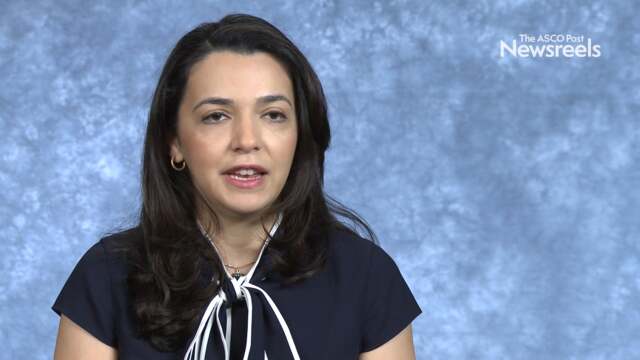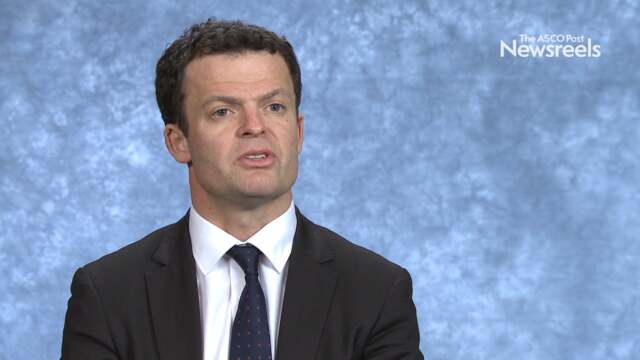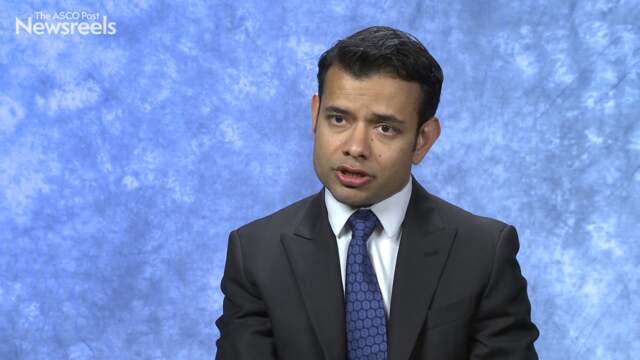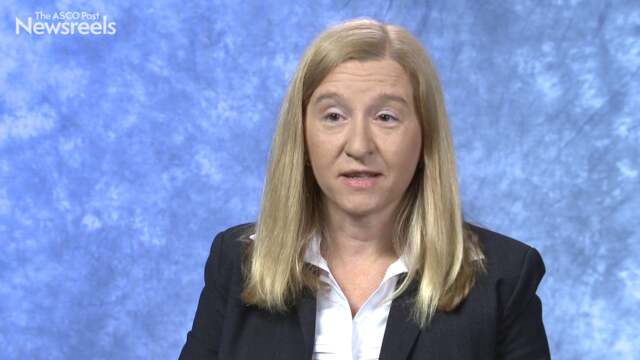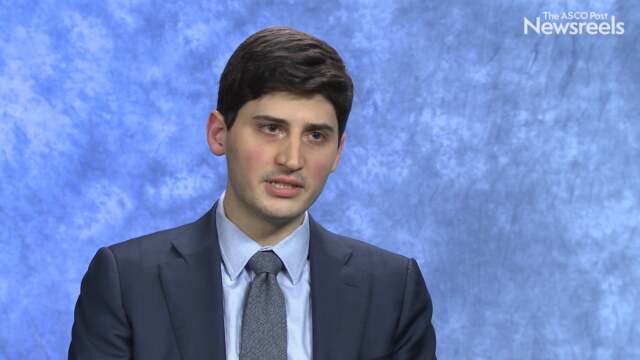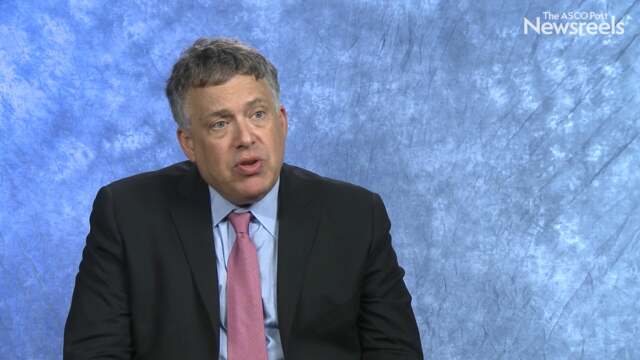Atezolizumab Plus Bevacizumab Improves Progression-Free Survival in First-Line Treatment of Advanced Renal Cell Carcinoma
THE TYROSINE KINASE inhibitor sunitinib (Sutent) has been the mainstay of treatment for first-line treatment of advanced renal cell carcinoma for about a decade. The IMmotion151 study reported at the 2018 Genitourinary Cancers Symposium found that the combination of the immune checkpoint inhibitor...
FDA Approves sBLA Updating Nivolumab Dosing Schedule Across Indications
On March 6, Bristol-Myers Squibb announced the U.S. Food and Drug Administration (FDA) has approved a supplemental Biologics License Application (sBLA) updating the nivolumab (Opdivo) dosing schedule to include 480 mg infused every 4 weeks for a majority of approved indications. This approval will ...
Circulating Tumor DNA and Pseudoprogression in Metastatic Melanoma Treated with Anti–PD-1 Antibodies
In a study reported in JAMA Oncology, Lee et al found that measurement of circulating tumor DNA (ctDNA) can help distinguish between pseudoprogression (radiologic progression prior to response) and true progression in patients with metastatic melanoma receiving anti–programmed cell death ...
Bevacizumab in Recurrent Glioblastoma
On December 5, 2017, bevacizumab (Avastin) was granted regular approval for the treatment of recurrent glioblastoma in adults.1 Bevacizumab was granted accelerated approval in May 2009 for use in treating patients with glioblastoma who had disease progression on prior therapy. Supporting Efficacy...
Body Mass Index and Outcomes With Targeted Therapy, Immunotherapy, or Chemotherapy in Metastatic Melanoma
In a study reported in The Lancet Oncology, McQuade et al found that obesity was associated with improved outcomes in treatment of metastatic melanoma with targeted therapy or immunotherapy—but not chemotherapy—with a survival benefit appearing to be restricted to obese male patients....
SBRT and Anti–PD-1 Treatment in Metastatic Solid Tumors
In a phase I study reported in the Journal of Clinical Oncology, Luke et al found that a strategy of multisite stereotactic body radiotherapy (SBRT) followed by pembrolizumab was feasible in patients with metastatic solid tumors. It was hypothesized that stimulation of immune responses by SBRT...
ASCO Clinical Practice Guideline: Management of Immune-Related Adverse Events in Patients Treated With Immune Checkpoint Inhibitor Therapy
As reported in the Journal of Clinical Oncology by Julie R. Brahmer, MD, of the Johns Hopkins Kimmel Cancer Center, and colleagues, ASCO has released a clinical practice guideline on management of immune-related adverse events in patients receiving immune checkpoint inhibitor therapy. To develop...
Long-Term Outcomes With PD-L1 Inhibition in Metastatic Urothelial Cancer
As reported by Petrylak et al in JAMA Oncology, long-term follow-up of patients in a phase I study expansion cohort indicated enduring clinical benefit and maintained tolerability of atezolizumab (Tecentriq) in patients with metastatic urothelial carcinoma. Study Details The study involved...
Pomalidomide and Low-Dose Dexamethasone in Patients With Multiple Myeloma and Renal Impairment
In a European phase II trial reported in the Journal of Clinical Oncology, Dimopoulos et al found that pomalidomide (Pomalyst) plus low-dose dexamethasone produced responses in patients with relapsed or refractory multiple myeloma and renal impairment. Study Details In the study, 81 patients with ...
Monoclonal Antibody Treatment in Newly Diagnosed Pediatric High-Grade Glioma
In a phase II study reported in the Journal of Clinical Oncology, Grill et al found that the addition of bevacizumab (Avastin) to radiotherapy plus temozolomide (RT + TMZ) did not improve event-free survival in pediatric patients with newly diagnosed high-grade glioma. Study Details In the...
Update on Phase III JAVELIN Lung 200 Trial of Avelumab Monotherapy in Previously Treated Patients With Advanced NSCLC
On February 15, updated results were made available from the phase III JAVELIN Lung 200 trial comparing avelumab (Bavencio) to docetaxel in patients with unresectable, recurrent, or metastatic non–small cell lung cancer (NSCLC) whose disease progressed after treatment with a...
FDA’s Oncologic Drugs Advisory Committee to Review Potential New Use of Blinatumomab
On February 14, Amgen announced that the Oncologic Drugs Advisory Committee of the U.S. Food and Drug Administration (FDA) will review data supporting the supplemental biologics license application (sBLA) for blinatumomab (Blincyto) for the treatment of patients with minimal residual disease...
FDA Expands Approval of Durvalumab to Reduce the Risk of NSCLC Progression
On February 16, the U.S. Food and Drug Administration (FDA) approved durvalumab (Imfinzi) for the treatment of patients with stage III unresectable non–small cell lung cancer (NSCLC) whose cancer has not progressed after treatment with chemoradiation. “This is the first treatment...
New ACCC Report Focuses on Immuno-Oncology, Cancer Care Delivery
As innovations in immunotherapies multiply, cancer programs and practices must overcome care coordination and communication challenges across the nation’s health-care system to integrate these advances into effective patient care. A new report from the Association of Community Cancer Centers...
Combination Radiotherapy and Immunotherapy Appears Safe and Clinically Active in Advanced Solid Tumors
Results from the first and largest prospective trial to determine the safety of multisite ablative stereotactic body radiotherapy (SBRT) in combination with anti–programmed cell death protein 1 (anti–PD-1) immunotherapy pembrolizumab (Keytruda) suggest the combination regimen may improve outcomes...
Combination Immunotherapy in DNA Mismatch Repair–Deficient/Microsatellite Instability–High Metastatic Colorectal Cancer
As reported in the Journal of Clinical Oncology by Overman et al, findings in the nivolumab (Opdivo) plus ipilimumab (Yervoy) cohort of the CheckMate-142 study indicate a high response rate and durable responses with the combination in previously treated patients with DNA mismatch...
ASCO and NCCN Provide Guidelines for Managing Immunotherapy Side Effects
Immunotherapy with immune checkpoint inhibitors is the first of a new generation of immunotherapy treatments, revolutionizing treatment for many different types of cancer. By unleashing the body's immune system to attack cancer, these treatments can send even the most hard-to-treat cancers into...
Neoadjuvant Trastuzumab Biosimilar vs Trastuzumab in HER2-Positive Early Breast Cancer
In a phase III trial reported in the Journal of Clinical Oncology, Pivot et al found equivalence of the trastuzumab biosimilar SB3 and the reference trastuzumab (Herceptin) in producing breast pathologic complete response in the neoadjuvant treatment of patients with HER2-positive early breast...
Gregory R. Pond, PhD, on Urothelial Cancer: Advance in Prognosis
Gregory R. Pond, PhD, of McMaster University, discusses a new six-factor prognostic model for patients with advanced urothelial carcinoma receiving post platinum atezolizumab (Abstract 413).
Jonathan E. Rosenberg, MD, on Urothelial Carcinoma: Results From the CheckMate 032 Trial
Jonathan E. Rosenberg, MD, of Memorial Sloan Kettering Cancer Center, discusses longer-term efficacy and safety findings on nivolumab monotherapy in metastatic urothelial carcinoma (Abstract 414).
Sumanta K. Pal, MD, on RCC: Results From Two Clinical Trials
Sumanta K. Pal, MD, of the City of Hope Comprehensive Cancer Center, discusses phase III study findings from IMmotion151, which looked at atezolizumab plus bevacizumab vs sunitinib in untreated metastatic renal cell carcinoma (RCC), and results from a safety and efficacy trial of axitinib in combination with pembrolizumab with advanced RCC (Abstracts 578 & 579).
Fatima Karzai, MD, on Prostate Cancer: Treatment Study Results
Fatima Karzai, MD, of the National Institutes of Health, discusses phase II findings on olaparib and durvalumab in metastatic castration-resistant prostate cancer in an unselected population (Abstract 163).
Thomas Powles, MD, on Urothelial Carcinoma: Results From the IMvigor211 Trial
Thomas Powles, MD, of Barts Cancer Institute, discusses phase III study findings on atezolizumab vs chemotherapy in platinum-treated locally advanced or metastatic urothelial carcinoma, with an emphasis on immune biomarkers, tumor mutational burden, and clinical outcomes (Abstract 409).
Laurence Albiges, MD, PhD, on RCC: Results From the NIVOREN GETUG-AFU 26 Trial
Laurence Albiges, MD, PhD, of the Gustave Roussy Cancer Centre, discusses study findings on the safety and efficacy of nivolumab in metastatic renal cell carcinoma (Abstract 577).
2018 GU CANCERS SYMPOSIUM: Early-Phase Trial of Glutaminase Inhibitor CB-839 in Combination With Cabozantinib or Everolimus in Renal Cell Carcinoma
Data on CB-839, a first-in-class glutaminase inhibitor, will be presented by Tannir et al at the 2018 Genitourinary Cancers Symposium in San Francisco (Abstract 603). The data are from the CX-839-001 study, which includes cohorts evaluating the safety, efficacy and recommended phase II dose of ...
2018 GU CANCERS SYMPOSIUM: Combination Therapy Shows Antitumor Activity in Advanced Renal Cell Carcinoma
Combining the antiangiogenic agent axitinib (Inlyta) with the immunotherapy pembrolizumab (Keytruda) was found to have promising antitumor activity and no unexpected side effects in an early-phase clinical trial in patients with advanced kidney cancer who had not been previously treated. The full...
Avelumab in Advanced Urothelial Carcinoma: Further Study Needed to Clarify its Role
AS REVIEWED in this issue of The ASCO Post, Patel and colleagues have presented data from the phase I JAVELIN study evaluating avelumab (Bavencio) in platinum-refractory patients with advanced urothelial carcinoma.1 The drug is active with durable responses when compared with historical...
Avelumab Active in Advanced Urothelial Carcinoma After Platinum Failure
AS REPORTED in The Lancet Oncology by Manish R. Patel, MD, of Florida Cancer Specialists/Sarah Cannon Research Institute, and colleagues, the anti–programmed cell death ligand 1 (PD-L1) antibody avelumab (Bavencio) produced durable responses in patients with locally advanced or metastatic...
Pembrolizumab Active in Thymic Carcinoma
In a single-center phase II study reported in The Lancet Oncology, Giaccone et al found that pembrolizumab (Keytruda) produced durable responses in patients with recurrent thymic carcinoma. Study Details In the study, 40 evaluable patients with advanced disease progressing after at least one line ...
Trastuzumab for 9 Weeks Fails to Show Noninferiority in HER2-Positive Breast Cancer
ANOTHER TRIAL has validated that 1 year of adjuvant trastuzumab (Herceptin) remains the standard in HER2-positive breast cancer, but the margin of difference, compared with just 9 weeks of the drug, was slim, based on the findings of the phase III SOLD trial reported at the 2017 San Antonio Breast...
Daratumumab Shows Efficacy in Amyloid Light-Chain Amyloidosis
DARATUMUMAB (DARZALEX) may be an effective treatment for systemic amyloid light-chain (AL) amyloidosis, according to phase II studies reported at the 2017 American Society of Hematology (ASH) Annual Meeting & Exposition.1,2 While the cohorts were small and the arms uncontrolled, the findings...
Superior Progression-Free Survival With First-Line Nivolumab Plus Ipilimumab vs Chemotherapy in NSCLC With High Tumor Mutation Burden
The ongoing phase III CheckMate-227 study met its coprimary endpoint of progression-free survival with a combination of nivolumab (Opdivo) plus ipilimumab (Yervoy) vs chemotherapy in patients with first-line advanced non–small cell lung cancer (NSCLC) whose tumors have a high (≥ 10...
2018 GU CANCERS SYMPOSIUM: Adding Immunotherapy to Standard Treatment Slows Growth of Advanced Kidney Cancer—With Fewer Side Effects
In a phase III clinical trial of patients with previously untreated metastatic renal cell cancer combining the immunotherapy atezolizumab (Tecentriq) with the targeted therapy bevacizumab (Avastin) delayed cancer growth by about 3 months longer than sunitinib, another targeted therapy. The benefit...
2018 GU CANCERS SYMPOSIUM: New Model Predicts Survival for People With Bladder Cancer Receiving Immunotherapy
Researchers have developed a model to predict overall survival for people with advanced urothelial cancers treated with the immune checkpoint inhibitor atezolizumab (Tecentriq). The model, which is based on six clinical factors, may help inform treatment decisions for use of atezolizumab in these...
Nivolumab With or Without Ipilimumab in Advanced Sarcoma
In the phase II Alliance A091401 trial reported in The Lancet Oncology, D’Angelo et al found evidence of activity of nivolumab plus ipilimumab in advanced sarcoma. Study Details The study comprised two noncomparative randomized phase II trials in which a total of 85 eligible patients...
Nivolumab Plus Ipilimumab Improves Outcomes in Metastatic Colorectal Cancer
IN THE FIRST REPORT of the full cohort of CheckMate-142, nivolumab (Opdivo) plus ipilimumab (Yervoy) led to a 1-year overall survival rate of 85% in previously treated patients with metastatic colorectal cancer who have DNA mismatch repair–deficient (dMMR) or microsatellite instability–high...
Daratumumab in Previously Treated Multiple Myeloma
On June 16, 2017, daratumumab -(Darzalex) was approved for use in combination with pomalidomide (Pomalyst) and dexamethasone for treatment of patients with multiple myeloma who have received at least two prior therapies including lenalidomide (Revlimid) and a proteasome inhibitor.1,2 Supporting...
Pembrolizumab in MSI-H or dMMR Solid Tumors: ‘First Tissue/Site-Agnostic’ Approval by FDA
On May 23, 2017, pembrolizumab (Keytruda) was granted accelerated approval for treatment of adult and pediatric patients with unresectable or metastatic microsatellite instability–high (MSI-H) or mismatch repair deficient (dMMR) solid tumors progressing following prior treatment and who have no...
Blinatumomab in Relapsed or Refractory B-Cell Precursor ALL
On July 11, 2017, blinatumomab (Blincyto) was approved for the treatment of relapsed or refractory B-cell precursor acute lymphoblastic leukemia (ALL) in adults and children.1,2 Blinatumomab received accelerated approval in December 2014 for the treatment of Philadelphia chromosome (Ph)-negative...
Updated Analysis of ELIANA Trial Shows Longer-Term Durable Remissions With Tisagenlecleucel in Children, Young Adults With Relapsed/Refractory ALL
Updated results from the ELIANA clinical trial of tisagenlecleucel (Kymriah), formerly CTL019, in relapsed or refractory pediatric and young adult patients with B-cell acute lymphoblastic leukemia (ALL) have been published by Maude et al in The New England Journal of Medicine. New data include...
Is There a Benefit of Maintenance Bevacizumab During Chemotherapy-Free Intervals in Metastatic Colorectal Cancer?
As reported by Aparicio et al in the Journal of Clinical Oncology, a French phase III trial (PRODIGE 9) showed no benefit of maintenance bevacizumab (Avastin) during postinduction chemotherapy-free intervals in metastatic colorectal cancer. Study Details In the open-label trial, 491 patients from ...
ASPIRE Trial: Final Overall Survival Results in Relapsed or Refractory Multiple Myeloma
The final overall survival results of the phase III ASPIRE trial indicate significant improvement with carfilzomib (Kyprolis), lenalidomide (Revlimid), and dexamethasone (KRd) vs lenalidomide plus dexamethasone (Rd) in patients who had received one to three prior lines of therapy for multiple...
Patients With Melanoma Treated With Anti–PD-1 Antibodies Beyond RECIST Progression
A pooled analysis by the U.S. Food and Drug Administration (FDA) has shown a benefit of treatment beyond progression, as defined by RECIST criteria, in many patients receiving anti–programmed cell death protein 1 (PD-1) antibodies for unresectable or metastatic melanoma. The analysis was ...
CAR T-Cell Immunotherapy Named Advance of the Year in ASCO’s Clinical Cancer Advances 2018
A new and unique new way to treat cancer—chimeric antigen receptor (CAR) T-cell therapy—is poised to transform the outlook for children and adults with certain otherwise incurable cancers. ASCO named this type of adoptive-cell immunotherapy the Advance of the Year in its annual...
Ann W. Silk, MD, and Katy K. Tsai, MD: Meeting Highlights
Ann W. Silk, MD, of the Rutgers Cancer Institute of New Jersey, and Katy K. Tsai, MD, of the University of California, San Francisco, who are Co-Chairs of the Clinical Immuno-Oncology Symposium, discuss highlights of the meeting and progress in the field.
Sumanta K. Pal, MD, on Renal Cancer Immunotherapy: Latest Developments
Sumanta K. Pal, MD, of the City of Hope, discusses immunotherapy as a front-line treatment for kidney cancer and the strategy of VEGF blockade with immunotherapy, which is emerging as a possible treatment modality.
Linda Mileshkin, MBBS, on Solid Tumors: Early Treatment Study Results
Linda Mileshkin, MBBS, of the Peter MacCallum Cancer Centre, discusses phase Ib trial findings on the anti–PD-1 monoclonal antibody BGB-A317 in combination with the PARP inhibitor BGB-290 in advanced solid tumors.
Jeffrey M. Lemons, MD, on Solid Tumors: Safety Data on SBRT and Immunotherapy
Jeffrey M. Lemons, MD, of the University of Chicago, discusses early safety and efficacy findings from a small study on pembrolizumab and multiorgan-site ablative stereotactic body radiotherapy in patients with advanced solid tumors (Abstract 20).
Roy S. Herbst, MD, PhD, on Personalized Immunotherapy for Lung Cancer: Expert Perspective
Roy S. Herbst, MD, PhD, of the Yale School of Medicine, summarizes a session that included discussion of the mechanisms of immunotherapies, biomarkers for activity of these agents, overcoming resistance, and using treatment combinations.
James L. Gulley, MD, PhD, on Prostate Cancer: Expanding Immunotherapy Options
James L. Gulley, MD, PhD, of the National Cancer Institute, discusses combined treatment approaches showing early evidence of clinical activity: agents such as vaccines or PARP inhibitors that can initiate an immune response, paired with agents such as checkpoint inhibitors that can facilitate the activity of tumor-directed immune cells.



